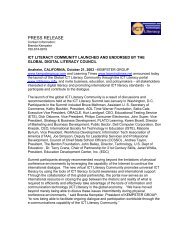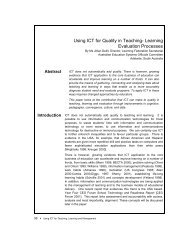147 pages pdf - ICT Digital Literacy
147 pages pdf - ICT Digital Literacy
147 pages pdf - ICT Digital Literacy
You also want an ePaper? Increase the reach of your titles
YUMPU automatically turns print PDFs into web optimized ePapers that Google loves.
Measure for Measure: Doing The “ROI” Thing<br />
#694: Show Me The Money<br />
If you want to demonstrate that your e-Learning was money well spent, then pre and post test.<br />
Wayne Soutter<br />
SkillWise<br />
#695: Think In Skills (Not Training) Metrics<br />
Find the person (or persons) responsible for e-Learning within your organisation and ask them if<br />
they believe they’re responsible for training or skills. Their answer will tell you a lot. If they<br />
believe they are responsible for training, their key metrics will be the number of training events<br />
they have organised, the number of attendees, the analysis of the critique sheets, and the<br />
average occupancy in the learning centre. But if they believe they’re responsible for skills, the<br />
key metrics they’ll talk about are the competency frameworks they’ve implemented, their<br />
assessment and testing processes, the size and impact of the skills gaps they’ve identified, the<br />
competency centres they’ve worked with, and the public value of the incremental skills that<br />
they’ve developed in employees over the last 12 months. Now, which conversation would you<br />
prefer to have? I’ll bet it’s the latter!<br />
Colin Steed<br />
UK Institute of IT Training<br />
#696: Measure The Gap<br />
Start with knowing the gap between the reality in your company and where you want to go. This can be a<br />
performance gap, a knowledge gap, etc. You can then use the gap(s) to understand if the e-Learning project<br />
was successful or not.<br />
Rodrigo Fernandez<br />
IN2<br />
#697: If It Gets Measured, It Gets Done<br />
Our program is designed with planned, prioritized groups of learners and a specific end date.<br />
Sanctions are imposed on those who do not complete the program in the time allotted unless it<br />
is with good reason. Sound harsh? We have found that people still have a problem with the<br />
perception of e-Learning not really mattering. They tend to regard it as second best and appear<br />
unable to manage the time to complete learning. However, if the learning is part of a program<br />
supported by their managers (and where these are judged and evaluated on the outcomes),<br />
students will complete it as required. Left to their own devices it is put off ad infinitum!<br />
Mary Vaughan<br />
West Mercia Constabulary<br />
#698: If Important, It Should Be Core<br />
Build e-Learning into the Performance Management process if you want to increase the usage of e-Learning.<br />
Peter LeCornu<br />
#699: Alter Measures As Learning Evolves<br />
Don't put all your evaluation time into completion rates. At a corporate level, proven knowledge<br />
and skills transfer is more relevant. And as just-in-time learning becomes more attractive to<br />
organizations, we must alter our evaluation methods to provide for just-in-time evaluation.<br />
Paul Allman<br />
The Edgeworks<br />
701 e-Learning Tips by The MASIE Center www.masie.com 137

















